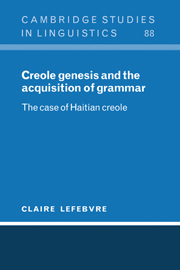Book contents
- Frontmatter
- Contents
- Tables
- Preface
- Abbreviations
- 1 The problem of creole genesis and linguistic theory
- 2 Cognitive processes involved in creole genesis
- 3 The research methodology
- 4 Functional category lexical entries involved in nominal structure
- 5 The preverbal markers encoding relative Tense, Mood and Aspect
- 6 Pronouns
- 7 Functional category lexical entries involved in the structure of the clause
- 8 The determiner and the structure of the clause
- 9 The syntactic properties of verbs
- 10 Are derivational affixes relexified?
- 11 The concatenation of words into compounds
- 12 Parameters
- 13 Evaluation of the hypothesis
- 14 Theoretical consequences
- Appendices
- Notes
- References
- Index of authors
- Index of languages and language families
- Index of subjects
2 - Cognitive processes involved in creole genesis
Published online by Cambridge University Press: 23 November 2009
- Frontmatter
- Contents
- Tables
- Preface
- Abbreviations
- 1 The problem of creole genesis and linguistic theory
- 2 Cognitive processes involved in creole genesis
- 3 The research methodology
- 4 Functional category lexical entries involved in nominal structure
- 5 The preverbal markers encoding relative Tense, Mood and Aspect
- 6 Pronouns
- 7 Functional category lexical entries involved in the structure of the clause
- 8 The determiner and the structure of the clause
- 9 The syntactic properties of verbs
- 10 Are derivational affixes relexified?
- 11 The concatenation of words into compounds
- 12 Parameters
- 13 Evaluation of the hypothesis
- 14 Theoretical consequences
- Appendices
- Notes
- References
- Index of authors
- Index of languages and language families
- Index of subjects
Summary
This chapter discusses the nature of the processes claimed to be involved in creole genesis – relexification, reanalysis and dialect levelling – and shows how they apply in that context. The mental process of relexification is argued to play a central role in creole genesis. As is advocated in Lefebvre and Lumsden (1994b), creole languages are formed when a group of people create new lexicons through relexification and use these relexified lexicons as the primary means of communication within the creole community. Section 2.1 discusses the formal representation of relexification. It is argued that this mental process is available to human cognition. Indeed, it has been shown to play a role in the formation of mixed languages (section 2.2) and pidgins (section 2.3) and in some cases of second language acquisition (section 2.4). The presence of substratal features in pidgins and creoles is generally attributed to calquing and transfer; however, the cases of calquing and transfer discussed in this chapter are argued to actually be the result of relexification. Section 2.5 presents the proposal that relexification plays a central role in creole genesis and shows how it applies in this context. But, although relexification is claimed to be the central process involved in creole genesis, it is not the only one. When speakers of a creole community start targeting the relexified lexicons rather than the superstratum language, two other processes are put to work in the development of the creole: reanalysis (section 2.6) and dialect levelling (section 2.7).
- Type
- Chapter
- Information
- Creole Genesis and the Acquisition of GrammarThe Case of Haitian Creole, pp. 15 - 51Publisher: Cambridge University PressPrint publication year: 1999



